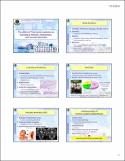บทคัดย่อ
The brain is a very critical organ that plays crucial roles in all most all
body functions such as sensation, movement, language, and thought. Among all
the functions, learning and memory are the fascinating ones, and have a lot of
impact on human behaviors both normal and abnormal. Learning is the process
in which the new information is acquired whereas memory is the process in
which that previously acquired knowledge is stored and maintained for later
use. The stored knowledge will then be the basic building blocks for behavior
formation, demonstrating the intricate links between these brain functions.
There are many conditions and diseases that will affect learning and memory
such as Alzheimer disease, vascular disease, and post-traumatic stress disorder.
The two most common types of memory impairment found in patients are
Alzheimer’s disease (AD) and vascular dementia (VaD). However, not only that
most of the medicines for these conditions are imported from foreign countries,
but the pathophysiology of the diseases is also far from known. Our laboratory
is interested in the enhancing effect of Thai herbal medicine on mechanisms of
learning and memory performance, and the possible therapeutic effect on
pathogenic mechanisms of vascular dementia. The animal models of vascular
dementia were tested with behavioral training protocol – Morris Water Maze.
Functions of the hippocampus, which is the brain area located in the medial
temporal lobe and is important for the acquisition (learning) and maintenance
of memory, were determined by electrophysiological study of long-term
potentiation (LTP), a synaptic mechanism underlying memory formation. The
hippocampus and other related brain structures were further examined by
immunohistological studies. Other techniques such as stereotaxic drug infusion
and molecular techniques would also be employed in order to unlock the
pathophysiology of the disease and to search for Thai herbal medicines that
might yield benefits to vascular dementia patients.


